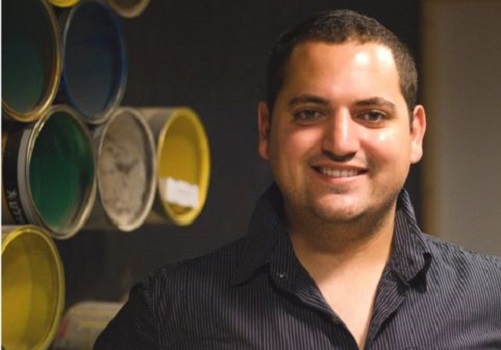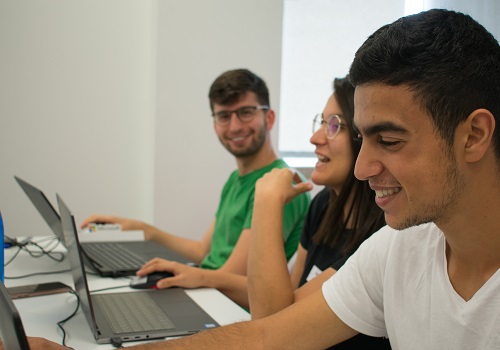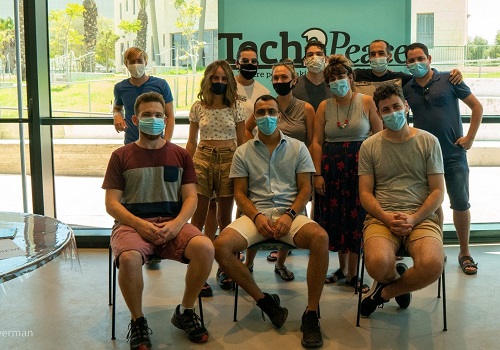With tensions high in the Middle East, SEE Change felt it both important and timely to highlight changemakers in the region focused on peacebuilding, unity and creating a brighter future together.
With that in mind, we recently spoke with social entrepreneur Tomer Cohen, co-founder of Tech2Peace, a joint Israeli-Palestinian NGO that brings Israelis and Palestinians together for seminars that blend technology & entrepreneurship training, conflict dialogue and continued community-building opportunities. The hope is to promote peace and shared goals, while developing skills in technology.
In our conversation Cohen shares the vision behind the young organization and how the founders are working hard to build a community of Israelis and Palestinians devoted to dialogue and peaceful coexistence. He discusses the challenges they face, the impact they’ve had so far, and the achievements that make him most proud today, despite the many obstacles in their way.
Briefly, tell us about you, your background, your journey to Tech2Peace
My name is Tomer Cohen, I am a Jewish-Israeli social entrepreneur and Co-Founder & Co-Executive Director at Tech2Peace. I grew up in Jerusalem during the second intifada, but started attending Israeli-Palestinian peace camps as I got older. In every camp I made great friendships, but after the programs finished, the friendships would disappear. Additionally, every year, most participants tended to be from the same liberal groups.
During my mandatory military service, I was a combat commander in a technological warfare unit, using technology to defend the country. But as the conflict waged around me, I often thought to myself,
“Why can’t we use this technology to wage peace and build bridges instead?”
I realized that technology can fix the problems of the peace camps by giving diverse Israelis and Palestinians life skills and shared goals that enable them to continue working together and achieve material success.
And I realized the relationships formed during technological training could also be better maintained through strong community-building. So during my first year as a university student, in partnership with two seasoned mediators, I launched Tech2Peace.
When was Tech2Peace founded and why? What is its vision?
Tech2Peace was founded in order to overcome the challenges of traditional peacebuilding models: that they attract only the ‘already convinced,’ that they fail to create lasting relationships beyond the initial program, and that they fail to create expanding impact beyond the immediate beneficiaries.
The mission of Tech2Peace is to build a lasting community of diverse, young Israeli and Palestinian leaders with the professional tools and cross-cultural networks to spread peace and coexistence at the highest levels of society, including through the high-tech sector, joint Arab-Jewish startups, and other professional collaborations.
We envision a community of thousands of young Palestinians and Israelis that stay connected as they build their professional careers, creating joint startups and other projects that demonstrate to a suspicious public that it is possible to cooperate across the border, and reaching high professional positions where they can leverage the influence of their companies to advocate for change.
What exactly do you do? How does it work?
We recruit young people, 50% Israeli and 50% Palestinian, 50% women and men, age 20-30, with diverse backgrounds and ideologies, predominantly from the socio-geographic periphery. We attract even moderate and nationalist participants that wouldn’t otherwise be interested in peacebuilding, who are incentivized to participate by the promise of economic empowerment delivered through training with our partners like Google, MIT and Microsoft.
Participants first attend a 12-day residential training seminar where they spend half the day learning a high-tech skill of their choice (Python, App Development, Video Editing, Artificial intelligence) and half the day in conflict dialogue. Participants build relationships and trust by working together through the high-tech training, setting the stage for effective dialogue. The seminar also includes lectures from prominent high-tech professionals and entrepreneurs, an exclusive Hackathon with Google for Startups, and fun social activities.
Following the seminars, participants join our vibrant alumni community, receiving at least monthly opportunities for technical training, dialogue, mentorship, networking, social activities, and other professional development opportunities.
What has been the impact so far?
Founded in 2018 and the winner of the Israeli President’s ‘Israeli Hope’ Award, Tech2Peace has now hosted five seminars, reaching 150 diverse beneficiaries (and more than 300 after the upcoming summer). Our extensive evaluations reveal that participants: (1) are non-traditional peacebuilders (over 70% from the periphery and 70% had few or no pre-existing relationships with the other); (2) build strong relationships and empathy; (3) spread ideas from Tech2Peace in their trusted circles; (4) engage in the alumni community; and (5) create joint initiatives and startups.
Tech2Peace has also managed to spread its model through publicity events (e.g. a Gathering including the CEO of Mellanox, the Israeli Science and Technology Minister, the Dutch Ambassador, and other notables) and the media (over 15 media items on Tech2Peace in the last year).
There is massive demand for Tech2Peace seminars (over 500 applicants for 60 spots last summer) and this demand will only grow as high-tech fields grow. Tech2Peace is growing exponentially, from one seminar the first year, two the second, three the third (with one cancelled due to Covid), and this year five are planned.
We maintain a strong alumni community, currently of 150 young Palestinians and Israelis after three years of activities, with over 80% participating in at least two activities per year. The community is increasingly self-sufficient: currently 30 alumni hold leadership roles, solely or with staff assistance organizing at least monthly activities (15 formal activities in 2021 so far) including networking events, dialogue (e.g. recent lecture and dialogue session with a US Foreign Service Officer); technical and soft-skills training (e.g. recent lecture series with Microsoft), sharing job and internship opportunities, mentorship (e.g. current program with Mckinsey & Co. Consultants), employability training, access to startup accelerators (e.g. our close partners, 50:50 Startups), training in dialogue facilitation, access to support for Arab-Jewish professional and social collaborative projects, and extended blended program (e.g. alumni-led three-day weekend seminar in East Jerusalem with high-tech training and dialogue).
Alumni have also created local organic communities in four cities and frequently meet-up informally. As alumni achieve professional success, we anticipate the community will sustain itself and grow through internal hiring, partnerships, and mentorship, creating a cycle of giving back within the community, providing value and maintaining connection.
The active participation and leadership of alumni in creating the community, and the strong personal bonds among alumni that exist outside of the influence of Tech2Peace staff (even throughout recent tensions in the region), are encouraging signs that the community will continue to thrive beyond the scope of this program or even of Tech2Peace.
Our alumni have gone on to create exciting startups and social initiatives, demonstrating to influential people and to the general public that our model works and that it is possible to cooperate across the border. For example, two alumni that built a nano-satellite had the opportunity to meet the Israeli Science and Technology Minister, telling him about Tech2Peace and persuading him to join a Tech2Peace publicity event. An alum led the first ever Arab-Jewish hackathon in Jerusalem, and two alumni created a startup facilitating medical transfers across the border – both making global news and creating hope for peace and cooperation.
What are your greatest challenges?
Our work is delicate and sensitive. Recent tensions in the region have reminded our community members of the deep divides between us and the very different ways in which we see the world. We’ve made so much progress in our community and our conflict, but events that inflame tensions feel like one step forward two steps back.
Despite recent tensions, our community has remained united through these hard times, and we are encouraged to see community members reaching out to support each other and keep talking. Like for many NGOs, reaching sustainable funding is difficult. There are so many NGOs doing important peacebuilding work and relatively small amounts of money available to support this work.
Beyond Theories of Change, evaluating outcomes and understanding impact, strategic planning, budget management, and other facets of NGO work, peacebuilding work often comes down to logistical challenges of working across an active conflict and international borders. Arranging permits for Palestinians to enter Israel, bringing Israelis to the West Bank, finding safe and suitable locations to meet, arranging logistics and housing, are all significant challenges in our work. While we try to focus on high-level impact, the daily ins and outs of peacebuilding work in this region are challenging.
What makes you most proud of your work?
Beyond the impressive joint initiatives and startups, high-tech successes, and inspiring social initiatives that emerge from our community, it is the love and connections inside of our community that give us the most inspiration.
In many peacebuilding programs participants have a great time, learn something, and then never see their new friends from the other side or do anything with their knowledge ever again. Our community continues to meet, both with and without our support, maintaining cross-border relationships and working together towards a better future we know is possible. When the community meets the feeling is of love and family.
Despite hard times in the region and difficult issues at the core of this conflict, we know our community is something special. Here are two quotes from participants after a recent alumni dialogue weekend focusing on coexistence in the shared city of Haifa:
“The weekend made me feel both hopeless and hopeful. Hopeless due to the incredible complexity of the conflict, hopeful because I believe in us”
‘Tech2peace is one big family and it really feels as such.’
What is your long-term plan for the organization?
We envision a cross-border community of thousands of Israelis and Palestinians working in diverse professional fields, creating joint companies and projects together, and leveraging the power of their industries and positions to widely spread a model of peaceful cooperation.
We will hold more and more seminars, reaching more and more Palestinians and Israelis, bringing them into our community which will grow to include more opportunities to create collaborative projects, with more financial and logistical support for joint startups and other initiatives.
We also aim to expand overseas, with MIT already having chosen our model to implement in South Africa, and organizations in Ireland, Switzerland, and the Balkans discussing with us how to bring our model to their contexts.



